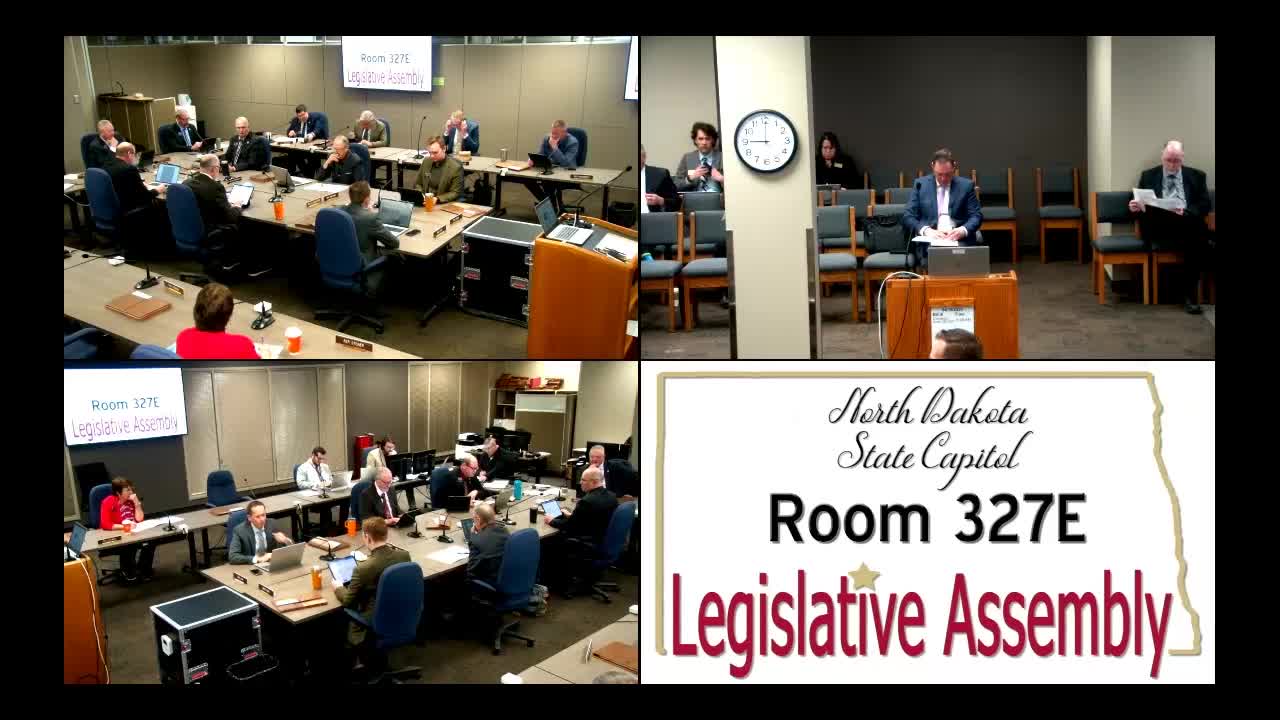Tax panel hears industry pitch to create temporary "development incentive well" exemption in SB 2397
Get AI-powered insights, summaries, and transcripts
Subscribe
Summary
The North Dakota Senate Finance and Taxation Committee on Wednesday considered an amendment to Senate Bill 23 97 (SB 2397) that would establish a temporary tax exemption for certified "development incentive wells," a narrowly targeted incentive sponsors said would spur technology testing, exploratory wells and enhanced oil recovery (EOR) work in existing spacing units.
The North Dakota Senate Finance and Taxation Committee on Wednesday considered an amendment to Senate Bill 23 97 (SB 2397) that would establish a temporary tax exemption for certified "development incentive wells," a narrowly targeted incentive sponsors said would spur technology testing, exploratory wells and enhanced oil recovery (EOR) work in existing spacing units.
Committee Chairman Hedlund opened the discussion and Representative Doctor introduced the amendment and the bill sponsor briefing. Nathan Anderson, director of the Department of Mineral Resources, and Timothy Nesheim, head of the subsurface section and manager of the Wilson Layered Core and Sample Library in Grand Forks, presented geological and production data; representatives from Continental Resources and the North Dakota Petroleum Council also testified in support.
Why it matters: Sponsors and industry witnesses said the incentive aims to encourage operators to test new drilling and completion techniques in existing spacing units where reservoir complexity and past industry practice have left economically recoverable oil behind. Proponents argued a temporary, limited exemption will produce a net fiscal return if successful exploration or EOR methods unlock additional long‑term production.
Committee discussion and testimony
Representative Doctor described the bill as responsive to pressures in the state budget and said "stripper wells are gonna be coming more and more" and that an incentive is needed for exploratory investment. Nathan Anderson said the amendment clarifies certification and that the industrial commission would certify wells. Anderson also noted he prefers the operator bear the burden to document that a proposed well qualifies as a "development incentive well." He told the committee, "My name is Nathan Anderson, director of the Department of Mineral Resources." (Nathan Anderson, Department of Mineral Resources.)
Geological evidence: Timothy Nesheim summarized a state geological review of the Bakken and 3‑Forks intervals and the results of a study of spacing units. Nesheim said his team "looked at 532 wells between the 3 reservoir intervals across 45 drilling spacing units" and found that in the 25 spacing units with Middle 3‑Forks (second bench) wells, 17 appeared to add long‑term volumetric reserves while six did not and two were indeterminate. He summarized average estimated ultimate recoveries (EURs) from the study: about 480,000 barrels for a Middle Bakken well, about 470,000 barrels for the Upper 3‑Forks and about 415,000 barrels for the Middle 3‑Forks. Nesheim said middle 3‑Forks results were more geologically variable.
Industry case for an incentive: William Houser, identified in committee comments as director of regulatory affairs for Continental Resources, described the amendment’s main provisions: a temporary extraction‑tax exemption for certified wells that would last 36 months or up to 300,000 barrels, whichever comes first; limits on certifications ("the industrial commission may not certify more than 1 development incentive well per technique per stratigraphic interval within the same spacing unit"); and extensions of existing Century Code exemptions related to on‑lease gas and on‑site electric generation used to avoid flaring. Houser asked the committee to view the measure "not as a tax expenditure, but as a strategic investment in North Dakota's energy future that will pay dividends for years to come." (William Houser, Continental Resources.)
John Argo, vice president for the Wilson Basin at Continental Resources, described company experience and the basin outlook, saying Continental employs about "300 folks working for us in North Dakota," and warned that exploration activity has declined from earlier years. Argo said the industry is moving in part to "harvest mode," leaving some potential reserves undeveloped because of economics, and that targeted incentives could encourage exploration and testing of new techniques. (John Argo, Continental Resources.)
Public‑interest and fiscal framing: Ron Ness, representing the petroleum industry, told the committee the incentive is "a tiny risk for a huge massive upside" for the state if it prompts successful testing. Speakers repeatedly emphasized the proposal’s temporary and narrowly defined nature as a fiscal safeguard: the exemption would apply only to certified wells and only for a limited time or production volume.
Committee questions and implementation concerns
Members asked technical and fiscal questions. Representative Steiner asked how many wells the exemption might incentivize and how the 36‑month / 300,000‑barrel limit would operate; Nathan Anderson said the first three years typically capture roughly 60% of a well’s early production and suggested the operator should demonstrate qualification. Representative Olson and others pressed for clarity about who bears the burden to document innovation and asked whether EOR applications have been filed in recent years; Anderson said the department did not have an exact count but believed applications for EOR status have been "less than a handful."
Outcome and next steps
The committee did not vote on SB 23 97 or on the amendment. Members agreed to pause the hearing so staff and agency representatives could prepare clarified language: Chairman Hedlund said the committee would "stand at ease" while drafters attempt to resolve outstanding points and expected revised language before the committee reconvened or possibly to address the matter in a conference committee if timing required. The record shows no formal action or vote on the amendment during this hearing.
Ending note
Committee discussion reflected a common theme from witnesses: proponents argue narrowly targeted, temporary tax exemptions can unlock exploratory work and potentially increase long‑term tax revenues, while staff and some members sought clearer assignment of the documentation burden and precise certification and time limits before committing to a final recommendation.
